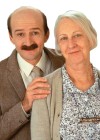An exercise in unrestrained quaintness
 Although today it looks predictably dated, the classic ABC comedy Mother and Son manages to achieve a feat few shows do – it gets better as the series goes on says Lee Zachariah.
Although today it looks predictably dated, the classic ABC comedy Mother and Son manages to achieve a feat few shows do – it gets better as the series goes on says Lee Zachariah.
Australians of a certain age – wedged in that narrow gap between those who watched Australian sitcom Mother and Son and those who have never heard of it – probably know of the show entirely from modern comedians (also of a certain age) who occasionally name drop it when wishing to paint the ABC as an antiquated trinket, decades behind the times and incessantly repeating what it doubtless perceives to be the ‘safest’ show in its back catalogue. Put simply, Mother and Son is shorthand for the national broadcaster’s terminal frumpiness.
But you’d be hard-pressed to actually find Mother and Son anywhere on the recent ABC schedule, which is surprising considering Auntie has thirty-eight-channels-and-counting to fill. No, if you want to see why so much fuss is made about the classic series you have to pick up the DVD.
So what is it, and why does it carry such a big literal and figurative weight? Of all the programs Australia has ever produced, this one represents the last vestige of our colonial heritage, our final attempt to convince ourselves we were still British.
It has a charmingly safe set up – a divorced man forced to move in with his doddering mother to look after her – and with so many of the guest actors insisting on speaking in Received Pronounciation, you’re forgiven for wondering if the show is set in the suburbs of Sydney or London.
At first, it bears this presumption out. The opening theme is an exercise in unrestrained quaintness, and the over lit three-walled set feels aggressively outdated from our 21st century perspective. Much like the BBC’s Keeping Up Appearances, its first season relies on a roster of callbacks to its mildly outrageous set up. Far from building upon the possibilities suggested by its premise, it simply reminds us of them.
But then something happens. By its second series, it’s giving up on the tea-and-crumpets set and going straight for the jugular; the writing is sharper, the actors completely in control. It’s as if Geoffrey Atherden, writer of all 42 episodes, has been suddenly pumped full of adrenaline. Hell, the show even features a perfectly executed slam-cut to an ambulance, beating The Simpsons to the same gag by about a decade. By the third series, it settles into the rhythm it will hold on to for the rest of its run: a farcical and wonderfully implausible series of events that, at its best, proudly recalls the heights of Fawlty Towers.
It is the Benjamin Button of TV comedy, a show that increasingly delivers on its premise as it gains speed, ramping up its momentum when other shows would be showing signs of exhaustion. The titular performances of Ruth Cracknell and Garry McDonald rank among the best this country has ever seen. Cracknell is completely fearless, playing Maggie Beare as a child one moment and a doddering old woman the next. It’s a performance that contains multitudes; as with all the great modern comic characters, Maggie is a blank slate upon which even the wildest contradictions feel within character.
In the supporting role of elder son Robbie, Henri Szeps gives one of the most unrelentingly slimy performances since Larry Linville’s Frank Burns. We are equally grateful whenever Judy Davis (as Robbie’s beleaguered wife Liz) is parachuted in to add a new dynamic to any given scene.
But the star of the show is surely Garry McDonald’s Arthur. It’s easy to forget what a departure this was for McDonald, going from the outrageous stunt-pulling Norman Gunston to a hapless everyman role unlike anything he’d done before.
Nowadays, it’s hard to think of McDonald as anyone but Arthur Beare. Sardonic yet cornered, Arthur becomes an iconic character thanks to the slightly oedipal suggestion that he is in a prison of his own making. And, importantly, of his own maintaining.
The final episode contains a glimmer of hope for Arthur, but it’s difficult to imagine that anything will truly change.
It’s high time that Mother and Son reclaimed its legacy.
Like Maggie Beare, it may look like a harmless, sweet-natured relic, but spend a little time with it and its true nature is revealed.
Lee Zachariah is a writer and critic. Find him on Twitter @leezachariah
- This article first appeared in Encore magazine. Download the iPad edition, now free.



